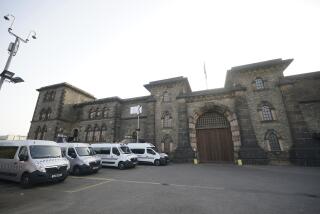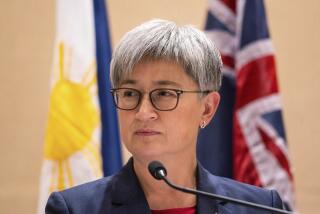British resident is first to be released from Guantanamo under Obama administration
- Share via
LONDON — A British resident who spent seven years in U.S. captivity and was allegedly tortured under questioning became the first prisoner Monday to be released from Guantanamo Bay by the Obama administration.
Binyam Mohamed, 30, returned to Britain as a free man after what he described as an ordeal he had never dreamed of in his “darkest nightmares,” one in which he was “abducted, hauled from one country to the next and tortured in medieval ways -- all orchestrated by the United States government.”
His case has been a lightning rod for criticism of the Guantanamo detention center, allegedly brutal treatment meted out by American security forces and the secrecy with which the United States and other countries have conducted controversial practices such as “extraordinary rendition.”
Mohamed spent four years in Guantanamo after being picked up in Pakistan in 2002 and interrogated in Morocco. U.S. authorities accused him of training in Al Qaeda camps and plotting with others to set off a “dirty bomb” in the United States.
But in October, the Pentagon dropped all charges against Mohamed, despite earlier statements that he had confessed to helping plan attacks on American cities. Mohamed says those supposed confessions were extracted from him by security agents who beat him, deprived him of sleep and slashed his genitals with a scalpel.
“He is a victim who has suffered more than any human being should ever suffer,” said Clive Stafford Smith, one of Mohamed’s lawyers. “He just wants to go somewhere very quiet and try to recover.”
His return to Britain came after a diplomatic tussle between the United States and its closest ally in the war on terrorism. The British government had pressed for Mohamed’s release and joined other European countries in urging Washington to shut down the heavily criticized detention center. President Obama’s pledge to do so has been a major factor in his popularity on this side of the Atlantic.
David Miliband, the British foreign secretary, welcomed Mohamed’s release as a step “toward the closure of Guantanamo Bay, which we all want.”
The former inmate, who is Ethiopian by birth but was a legal British resident at the time of his arrest, was flown to a British military base on the edge of London. After several hours of questioning by police and immigration authorities, Mohamed, wearing bluejeans and a white skullcap, emerged a free man.
“I am so glad and so happy, more than words can express,” said his sister Zuhra. “I am so thankful for everything that was done for Binyam to make this day come true.”
The controversy surrounding his years in detention will continue, however.
This month, the British high court ruled that certain details about Mohamed’s time and treatment in custody could be kept confidential by the government, but the justices blamed the blackout on U.S. threats to stop cooperating with British intelligence authorities if the information were released. The information in question amounted to 25 lines of text, but reputedly contained accounts of torture.
Britain’s attorney general also has begun investigating whether British agents were complicit in Mohamed’s alleged torture during questioning in Pakistan, where he was arrested on a passport violation.
Mohamed’s lawyers say their client was shipped from Pakistan to Morocco under U.S. rendition procedures and subjected to further interrogation for 18 months that included physical and sexual abuse.
In addition, Mohamed is the lead plaintiff in a lawsuit against Jeppesen DataPlan Inc., a transport services company based in San Jose that provided the aircraft and flight crews for the renditions of dozens of men that the CIA allegedly snatched in foreign countries and transported to foreign interrogation sites.
The suit was dismissed at the Bush administration’s request by the U.S. District Court for Northern California but is pending before the 9th Circuit Court of Appeals.
In Washington, a senior Navy officer who carried out a review of the Guantanamo facility ordered by Obama concluded that the camp conforms with Geneva Convention standards for humane treatment of prisoners.
“We reviewed numerous reports, video, discipline records and observed many aspects of daily operations. Collectively we talked to a number of detainees and observed daily activities,” Vice Adm. Patrick Walsh said at a briefing on the report. “It is our judgment that the conditions of confinement, in Guantanamo, are in conformity with Common Article 3 of the Geneva Conventions.”
Walsh acknowledged that his team did not speak with former prisoners who have alleged that they suffered abuse at the camp.
“The effective order directed us to take a look at conditions today,” he said. “I was not in a position to go back through the many years of camp experience and determine whether or not some action had taken place in the camp’s history. That was not our goal.”
His group recommended that captives be allowed more opportunities for social interaction with each other to reduce stress among them.
--
--
Times staff writer Carol J. Williams in Los Angeles contributed to this report.
More to Read
Sign up for Essential California
The most important California stories and recommendations in your inbox every morning.
You may occasionally receive promotional content from the Los Angeles Times.











